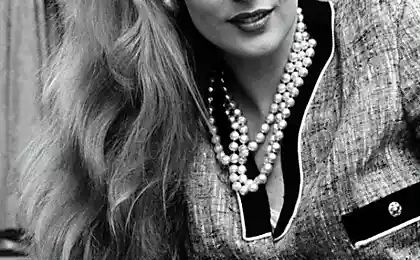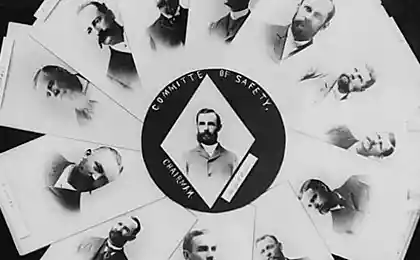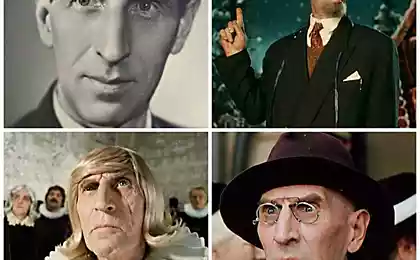648
"The society of the spectacle": what we warned, guy Debord in 1967
What is the place allotted to man in the modern world? How and who controls our life? What is the reason for our humility to the established rules? To answer these questions, we will help the work of guy Debord "the society of the spectacle", which for half a century has not lost its relevance.
Today, having information about what is happening around the world, we were not able to comprehend their behavior,i.e. Watching the performance taking place on stage, we lost sight of ourselves, how we understand our lives? How our desires and actions are dependent on us? What fascinates us more than ourselves?
Every day watching news, newspaper, TV, we unwittingly become witnesses to the thousands of events happening around the globe, observers of civil wars, strikes, terrorist attacks, elections, etc. We can cold treat for these events and can make them a part of your life, but it cannot be denied that their influence on us is a total character.
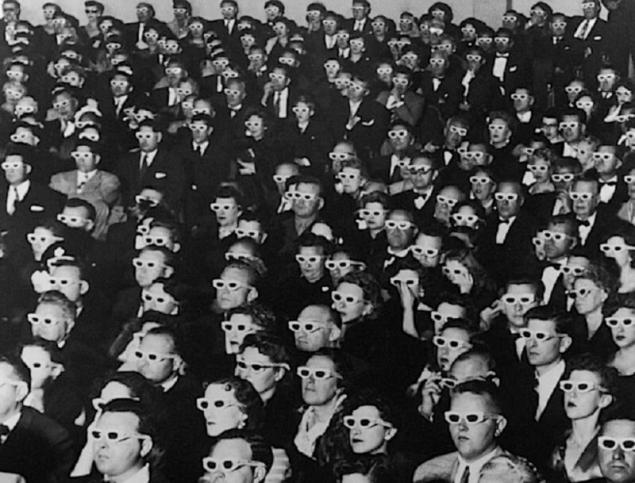
Cover: LIFE, 1952
Wake up, we shower, cook and drink coffee, sleepily looking through the news online or on TV. We're then going about their business as if forgetting everything that inadvertently learned over Breakfast about the tragedies and injustices around the world. First of all is a life.
Everyone wants to be a Director of this life, everyone wants to write a script and perform on stage a major role, but in the end we are only looking for their seats, the tickets already purchased: after all, what happened at Breakfast, not forgotten, it has somehow affected us.
Of course, it's just a metaphor, but do you know the feeling of unreality of the world, when suddenly you become the observer of your body, their property, their lives? This feeling S. Sontag describes as follows:
"During the attack at the international trade center on 11 September 2001, those who escaped from the towers or watched their near collapse, often described their first experiences as "unreal," "surreal," as "cinema". (After forty years of big-budget Hollywood disaster movies, "It was like a movie" – a phrase that expressed the first shock of the witnesses of the disaster – came to replace the old: "It was like a dream").
In other words, all that was experienced directly, now has the distance and is experienced as a game. Why is this happening? How and why has changed our perception and whether there was a place for humans in the new world?
The play and production in the age of affluence, or the totality of the play
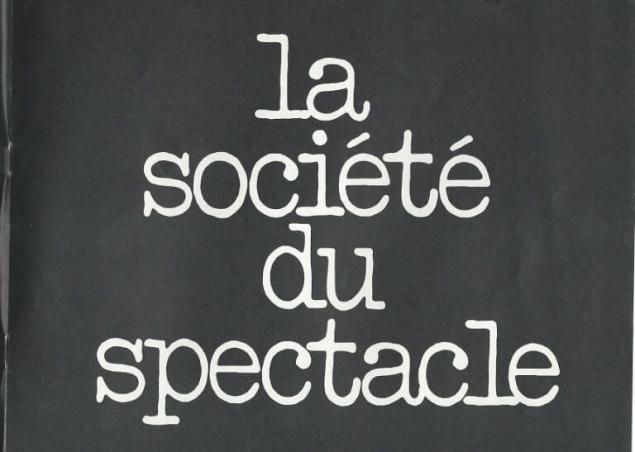
In 1968, guy Debord published his most famous work "the society of the spectacle", where he outlined the contemporary social trends. Since the author is not indifferent to Marxism, he declares the means of production the basis of society in which the spectacle is both the result and the project of the production method.
"The play constructs a model of socially dominant life. It is widespread confirmation of the choice already made in production.
The play is a stimulator of consumption, creating a flexible lifestyle that require continuous participation in the process. All that remains beyond the scope of the production, one way or another in contact with consumption, everything is subordinated to the play, he chooses for us what is beneficial to production.
The origins of the play
"The source of the play is the loss of unity of the world, and the gigantic expansion of the modern spectacle expresses the completeness of this loss: the abstraction of all private labor and the General abstraction combines the production of fine is passed in the play, whose specific mode of existence is abstraction. In the play one part of the world represents itself before the world and is superior to him."
The author therefore equates the performance to the absolute, robs human autonomy. The performance of the transcendental world, and therefore our I need him for their existence.
In other words, in modern society, consumption is a comprehensive religion, there are temples of consumption in the form of supermarkets or shopping malls, and the society brings sacrifices to the pagan God, whose name Spectacle.
This focus on the abstract spectacle only a person takes the time and energy he could use to engage them and to solve specific problems. "What problems are you talking about? I can't wait: in September there is a new operating system! Will need to update your laptop and smartphone!".
"All the world's a stage", and people?
In the modern world of the actors, ready to perform its role under the guidance of talented or not so directed. Now the man is just a viewer, have lost their opportunity to act. His destiny – silently monitor played out the show.
"Who has occupied the position of the observer – will never do: this is the main rule for the viewer."
The Director of the play is no longer a person, he is abstract, so the dialogue with him is impossible, because people are not able to understand the irrational.
The play defies the laws of formal logic. A person can only imitate what they see, its gods are individuals acting on stage: "experts, journalists, politicians". They explain to the layman, which is useful in the modern market. However, whatever the audience chose, everything is already written in the script, which includes not only the present, but with him the past and the future.
"The play of anyone not concealing the fact that marvelous order established by him, surrounded on all sides by mortal danger".
To this kind of danger is all that didn't matter much to humans several decades ago: the pollution of the oceans, deforestation, starving third world countries, terrorism, etc that does not pose a real threat to performance, but allows you to create the illusion of activity to keep a man in constant tension.
Historical, formal logic, rational – everything that helps a person find meaning, it is dangerous for performance, because the meaning is beyond, and therefore, can destroy performance. Performance changes the understanding of the rational, replacing it with wide or bounded rationality, which are either already included elements of the irrational, or excluded by the scope of the senses.
Society fans
In every field of human activity, there are authorities who are carriers of true knowledge. In the society of the spectacle is the so-called "stars", they dictate to a man how and what to consume, the number of "stars" equal to the number of ways of consumption, and one can choose as a reference someone who he likes.
"The style of clothing arises from the film, creates the name of the clubs and societies, and those styles are different sets of goods."
Even if we understand the artificiality of such advertising, we still klyuem on it because one or the other our favorite appears on the screen with this gadget, or machine. However, any item destined to be a dummy to die in a symbolic sense, to become obsolete and lose prestige.
What should I do?
As with other critical work of the French intellectuals, "Society of the spectacle" does not give this question answer. You can only watch the world and wait patiently for the end of the world, which will put the final point, becoming the climax of the play.
However, this local the end of the world every day in one way or another point of the planet. War, disasters, poverty is something that surrounds many of the inhabitants of the Earth. Claiming the universality of the play as if the author claims that the suffering of these people are ephemeral, they exist for the average consumer only as an object of compassion and no more.
Whether Debord seeks to convince others that the real problems of mankind, such as war, really do not concern us? Why is this metaphor stuck and what meanings it is able to grasp?
After the publication of the work of guy Debord has been hailed by critics ambiguous, however, subsequent events such as the student uprising in France, the introduction of Soviet tanks in Czechoslovakia, etc., have only confirmed the theory of the author. Despite the growing interest in the problem of changes in the culture, the metaphor of the play quickly became traditional to refer to the condition of modernity.
This metaphor is simple and clear to everyone, it requires no explanation, and most importantly, it is possible to justify any actions. It's all an act, we live in an unreal world, but because you can with impunity break any promises and ethical standards of people in this world able just to copy what they saw on TV and have fun without thinking about the consequences, and this is a good justification for this way of thinking and behavior.
Very curious. Russian catch phrase: the secret meaning
7 phrases that will help you pay off the emerging conflict
After reviewing another collection of news, we suddenly think: "there are hundreds of threats, but now in my town all right, and then I can make the world a safer, better. I have the chance!" Every day the play confronts us with a moral choice: "How to use my freedom today?". Of course, he'll offer a lot of options, but before we were shown the advertising, the choice is ours.published
Source: monocler.ru/obshhestvo-spektaklya/
Today, having information about what is happening around the world, we were not able to comprehend their behavior,i.e. Watching the performance taking place on stage, we lost sight of ourselves, how we understand our lives? How our desires and actions are dependent on us? What fascinates us more than ourselves?
Every day watching news, newspaper, TV, we unwittingly become witnesses to the thousands of events happening around the globe, observers of civil wars, strikes, terrorist attacks, elections, etc. We can cold treat for these events and can make them a part of your life, but it cannot be denied that their influence on us is a total character.

Cover: LIFE, 1952
Wake up, we shower, cook and drink coffee, sleepily looking through the news online or on TV. We're then going about their business as if forgetting everything that inadvertently learned over Breakfast about the tragedies and injustices around the world. First of all is a life.
Everyone wants to be a Director of this life, everyone wants to write a script and perform on stage a major role, but in the end we are only looking for their seats, the tickets already purchased: after all, what happened at Breakfast, not forgotten, it has somehow affected us.
Of course, it's just a metaphor, but do you know the feeling of unreality of the world, when suddenly you become the observer of your body, their property, their lives? This feeling S. Sontag describes as follows:
"During the attack at the international trade center on 11 September 2001, those who escaped from the towers or watched their near collapse, often described their first experiences as "unreal," "surreal," as "cinema". (After forty years of big-budget Hollywood disaster movies, "It was like a movie" – a phrase that expressed the first shock of the witnesses of the disaster – came to replace the old: "It was like a dream").
In other words, all that was experienced directly, now has the distance and is experienced as a game. Why is this happening? How and why has changed our perception and whether there was a place for humans in the new world?
The play and production in the age of affluence, or the totality of the play

In 1968, guy Debord published his most famous work "the society of the spectacle", where he outlined the contemporary social trends. Since the author is not indifferent to Marxism, he declares the means of production the basis of society in which the spectacle is both the result and the project of the production method.
"The play constructs a model of socially dominant life. It is widespread confirmation of the choice already made in production.
The play is a stimulator of consumption, creating a flexible lifestyle that require continuous participation in the process. All that remains beyond the scope of the production, one way or another in contact with consumption, everything is subordinated to the play, he chooses for us what is beneficial to production.
The origins of the play
"The source of the play is the loss of unity of the world, and the gigantic expansion of the modern spectacle expresses the completeness of this loss: the abstraction of all private labor and the General abstraction combines the production of fine is passed in the play, whose specific mode of existence is abstraction. In the play one part of the world represents itself before the world and is superior to him."
The author therefore equates the performance to the absolute, robs human autonomy. The performance of the transcendental world, and therefore our I need him for their existence.
In other words, in modern society, consumption is a comprehensive religion, there are temples of consumption in the form of supermarkets or shopping malls, and the society brings sacrifices to the pagan God, whose name Spectacle.
This focus on the abstract spectacle only a person takes the time and energy he could use to engage them and to solve specific problems. "What problems are you talking about? I can't wait: in September there is a new operating system! Will need to update your laptop and smartphone!".
"All the world's a stage", and people?
In the modern world of the actors, ready to perform its role under the guidance of talented or not so directed. Now the man is just a viewer, have lost their opportunity to act. His destiny – silently monitor played out the show.
"Who has occupied the position of the observer – will never do: this is the main rule for the viewer."
The Director of the play is no longer a person, he is abstract, so the dialogue with him is impossible, because people are not able to understand the irrational.
The play defies the laws of formal logic. A person can only imitate what they see, its gods are individuals acting on stage: "experts, journalists, politicians". They explain to the layman, which is useful in the modern market. However, whatever the audience chose, everything is already written in the script, which includes not only the present, but with him the past and the future.
"The play of anyone not concealing the fact that marvelous order established by him, surrounded on all sides by mortal danger".
To this kind of danger is all that didn't matter much to humans several decades ago: the pollution of the oceans, deforestation, starving third world countries, terrorism, etc that does not pose a real threat to performance, but allows you to create the illusion of activity to keep a man in constant tension.
Historical, formal logic, rational – everything that helps a person find meaning, it is dangerous for performance, because the meaning is beyond, and therefore, can destroy performance. Performance changes the understanding of the rational, replacing it with wide or bounded rationality, which are either already included elements of the irrational, or excluded by the scope of the senses.
Society fans
In every field of human activity, there are authorities who are carriers of true knowledge. In the society of the spectacle is the so-called "stars", they dictate to a man how and what to consume, the number of "stars" equal to the number of ways of consumption, and one can choose as a reference someone who he likes.
"The style of clothing arises from the film, creates the name of the clubs and societies, and those styles are different sets of goods."
Even if we understand the artificiality of such advertising, we still klyuem on it because one or the other our favorite appears on the screen with this gadget, or machine. However, any item destined to be a dummy to die in a symbolic sense, to become obsolete and lose prestige.
What should I do?
As with other critical work of the French intellectuals, "Society of the spectacle" does not give this question answer. You can only watch the world and wait patiently for the end of the world, which will put the final point, becoming the climax of the play.
However, this local the end of the world every day in one way or another point of the planet. War, disasters, poverty is something that surrounds many of the inhabitants of the Earth. Claiming the universality of the play as if the author claims that the suffering of these people are ephemeral, they exist for the average consumer only as an object of compassion and no more.
Whether Debord seeks to convince others that the real problems of mankind, such as war, really do not concern us? Why is this metaphor stuck and what meanings it is able to grasp?
After the publication of the work of guy Debord has been hailed by critics ambiguous, however, subsequent events such as the student uprising in France, the introduction of Soviet tanks in Czechoslovakia, etc., have only confirmed the theory of the author. Despite the growing interest in the problem of changes in the culture, the metaphor of the play quickly became traditional to refer to the condition of modernity.
This metaphor is simple and clear to everyone, it requires no explanation, and most importantly, it is possible to justify any actions. It's all an act, we live in an unreal world, but because you can with impunity break any promises and ethical standards of people in this world able just to copy what they saw on TV and have fun without thinking about the consequences, and this is a good justification for this way of thinking and behavior.
Very curious. Russian catch phrase: the secret meaning
7 phrases that will help you pay off the emerging conflict
After reviewing another collection of news, we suddenly think: "there are hundreds of threats, but now in my town all right, and then I can make the world a safer, better. I have the chance!" Every day the play confronts us with a moral choice: "How to use my freedom today?". Of course, he'll offer a lot of options, but before we were shown the advertising, the choice is ours.published
Source: monocler.ru/obshhestvo-spektaklya/




